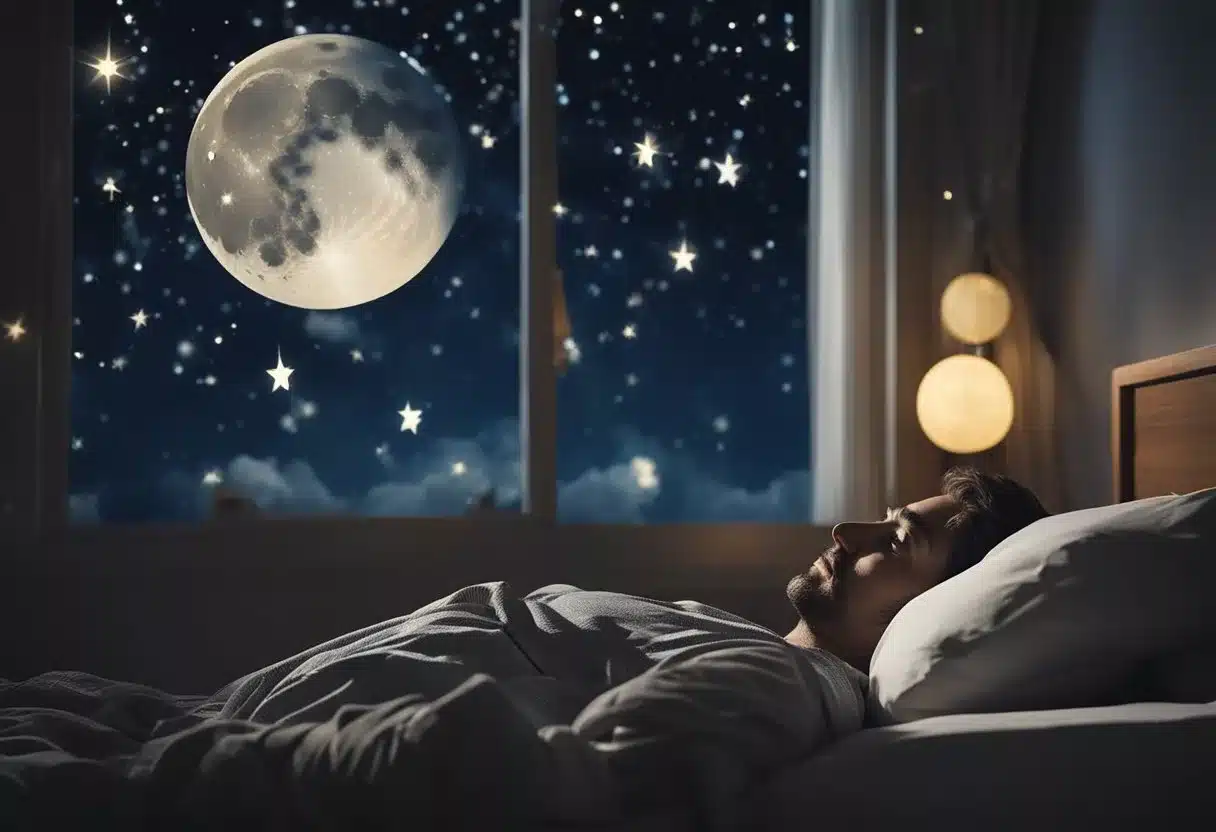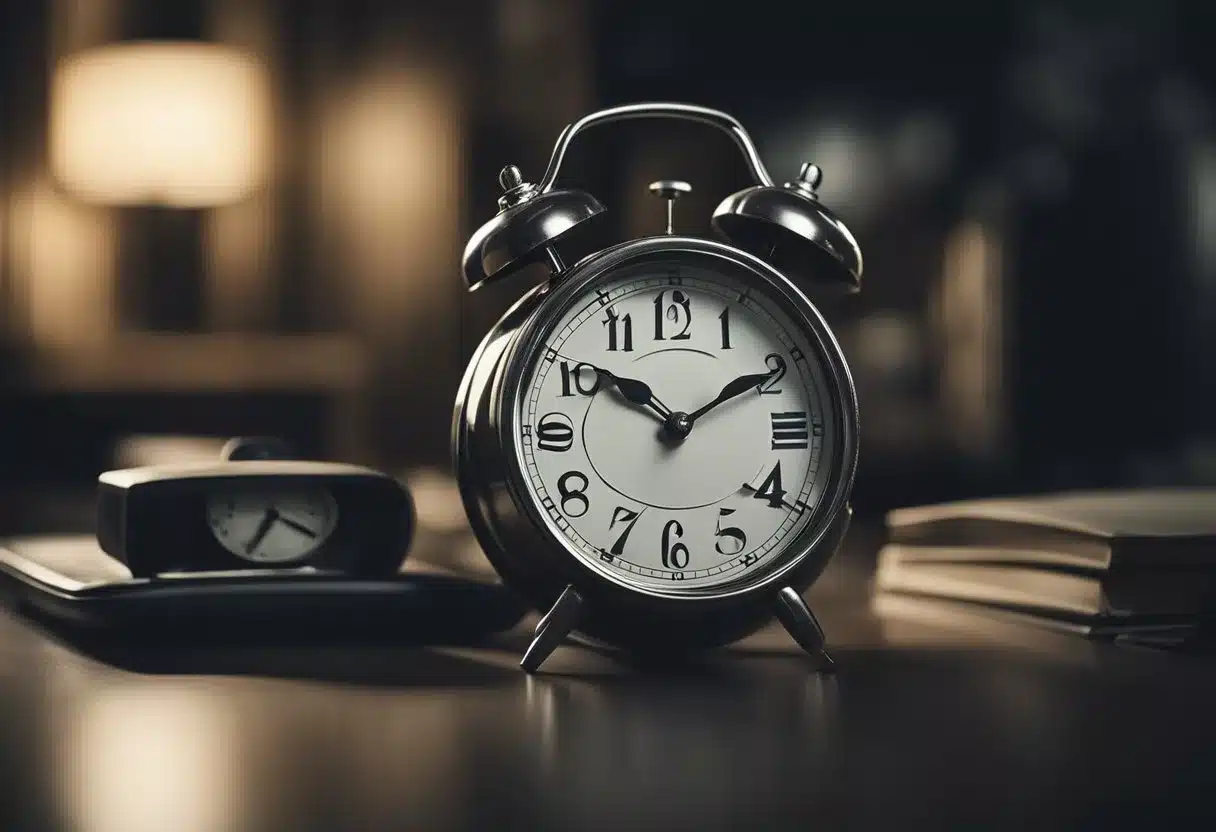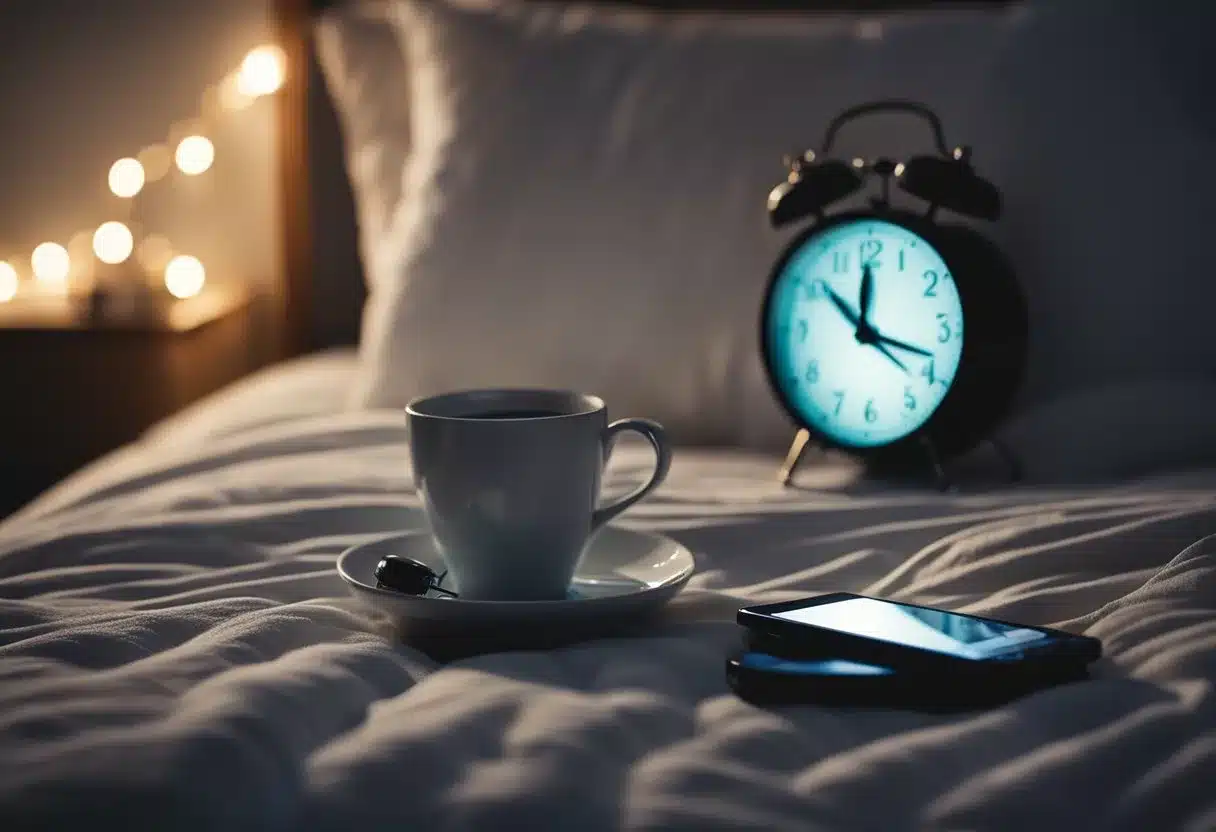Insomnia affects millions of people worldwide, making it hard to fall asleep or stay asleep through the night. This common sleep disorder can leave you feeling tired, irritable, and unable to focus during the day. Roughly 1 in 3 adults have insomnia symptoms, with about 10% meeting the criteria for insomnia disorder.
 [1]
[1]What to do before bed to sleep better:
Watch the video NOW![2]
There are many potential causes of insomnia, ranging from stress and anxiety to medical conditions and lifestyle habits. Understanding these causes can help people take steps to improve their sleep quality and overall health. By identifying the root of sleep problems, individuals can work with healthcare providers to find effective solutions and get back to restful nights.
1) Stress and Anxiety

Stress and anxiety are major causes of insomnia. When people feel worried or tense, their minds often race with thoughts at night. This can make it hard to fall asleep or stay asleep.
Anxiety at night can lead to insomnia. Many people with anxiety disorders also have sleep problems. Doctors often ask about sleep issues when diagnosing anxiety.
Stressful life events can trigger insomnia. Things like job loss, relationship problems, or money worries keep people up at night. Even positive changes like a new job or baby can cause sleep issues.
The body’s stress response can make sleep difficult. It releases hormones that increase alertness and heart rate. This “fight or flight” state is not good for rest.
Stress and sleep problems can create a cycle. Lack of sleep causes more stress during the day. This leads to more trouble sleeping at night. Breaking this pattern often requires addressing both the stress and the insomnia.
2) Poor Sleep Environment

A poor sleep environment can make it hard to fall asleep or stay asleep. Noise is a big problem for many people. Loud sounds from traffic, neighbors, or pets can wake you up at night.
Light can also keep you awake. Too much light from street lamps, electronics, or early morning sun can disrupt sleep patterns[3].
Temperature plays a key role in sleep quality. A room that’s too hot or cold can make it hard to get comfortable. Most people sleep best in a cool room, around 60-67 degrees Fahrenheit.
Uncomfortable bedding can cause sleep issues. An old mattress, lumpy pillows, or scratchy sheets may lead to tossing and turning all night.
Clutter or work materials in the bedroom can be distracting. These items can make it hard to relax and wind down for sleep.
Pets in the bed can also disturb sleep. While some find it comforting, others may be woken up by pet movements or noises during the night.
3) Irregular Sleep Schedule
An irregular sleep schedule can lead to insomnia. This happens when a person goes to bed and wakes up at different times each day. The body’s internal clock gets confused, making it hard to fall asleep or stay asleep.
Many things can cause an irregular sleep schedule. Shift work is a common reason. People who work nights or rotating shifts often struggle to maintain a steady sleep routine.
Jet lag from travel across time zones can also disrupt sleep patterns. The body needs time to adjust to new schedules, which can cause temporary insomnia.
Inconsistent bedtimes are another factor. Some people stay up late on weekends and go to bed early on weekdays. This confuses the body’s natural sleep-wake cycle.
Circadian rhythm disorders[4] can also cause irregular sleep. These disorders affect the body’s internal clock, making it hard to sleep at normal times.
To fix this, experts suggest sticking to a regular sleep schedule. This means going to bed and waking up at the same time every day, even on weekends. Over time, this can help reset the body’s internal clock and improve sleep quality.
4) Medications

Many common medications can disrupt sleep and lead to insomnia. Some drugs affect the brain’s sleep-wake cycle, making it harder to fall asleep or stay asleep.
Beta blockers[5] used for high blood pressure and heart conditions may cause sleep problems. These include metoprolol, carvedilol, and propranolol.
Certain antidepressants can also interfere with sleep. Some stimulate the brain, while others may cause nightmares or vivid dreams.
Over-the-counter pain medicines[6] like ibuprofen and naproxen sometimes lead to insomnia, especially in higher doses. They can cause stomach discomfort that keeps people awake.
Cold and allergy medications containing pseudoephedrine often disrupt sleep. This decongestant ingredient has stimulant effects.
Some prescription drugs for conditions like ADHD contain stimulants that make falling asleep difficult. Corticosteroids used to treat inflammation can also cause sleep problems.
People taking medications and experiencing sleep issues should talk to their doctor. The dosage or timing of medications may need adjustment to improve sleep quality.
5) Caffeine and Nicotine

Caffeine and nicotine are common stimulants that can disrupt sleep patterns. Many people consume these substances daily, often unaware of their impact on sleep quality.
Caffeine is found in coffee, tea, soda, and chocolate. It blocks adenosine receptors in the brain, which normally promote sleepiness. This blockage can make it harder to fall asleep and reduce sleep quality.
Nicotine, present in cigarettes and e-cigarettes, also acts as a stimulant. It can cause sleep issues by increasing heart rate and alertness. Smokers often experience difficulty falling asleep and may wake up frequently during the night.
Both substances can stay in the body for hours after consumption. Experts recommend avoiding caffeine at least 8 hours before bedtime to minimize its effects on sleep.
For those trying to quit smoking, nicotine replacement therapy may help. However, it’s important to use these products earlier in the day to prevent sleep disturbances.
Reducing or eliminating caffeine and nicotine intake, especially in the evening, can significantly improve sleep quality for many individuals struggling with insomnia.
6) Poor Sleep Habits

Poor sleep habits can lead to insomnia. Going to bed at different times each night disrupts the body’s natural sleep-wake cycle. This makes it harder to fall asleep and wake up at consistent times.
Using electronic devices before bed is another bad habit. The blue light from screens can interfere with melatonin production, making it harder to fall asleep.
Eating large meals or exercising too close to bedtime can also cause sleep problems. These activities energize the body when it should be winding down.
Napping during the day, especially for long periods, can throw off nighttime sleep. It’s best to avoid naps or keep them short, around 20-30 minutes.
Having an uncomfortable sleep environment is another issue. A bedroom that’s too hot, cold, noisy, or bright can make it difficult to fall and stay asleep.
Drinking caffeine or alcohol late in the day can disrupt sleep patterns. Caffeine is a stimulant, while alcohol may help with falling asleep but often leads to poor sleep quality.
7) Chronic Pain

Chronic pain can be a major cause of insomnia. Many people with ongoing pain find it hard to fall asleep or stay asleep through the night.
Pain from conditions like arthritis, fibromyalgia, or back problems can make getting comfortable in bed difficult. This discomfort often leads to tossing and turning, disrupting sleep patterns.
Insomnia is common in people with chronic pain. Up to half of those with chronic low back pain report sleep problems.
The relationship between pain and sleep goes both ways. Poor sleep can make pain feel worse, while pain can make it harder to sleep well.
People with chronic pain may also feel anxious about their condition. This anxiety can add to sleep troubles, creating a cycle that’s hard to break.
Some pain medications can affect sleep too. They might cause side effects that make falling asleep harder.
Getting good sleep with chronic pain can be tricky. It often requires working with a doctor to manage pain effectively and improve sleep habits.
8) Mental Health Disorders

Mental health issues can greatly affect sleep patterns. Anxiety disorders often lead to racing thoughts at night, making it hard to fall asleep. People with anxiety may worry about future events or replay past situations in their minds.
Depression is another common cause of insomnia. Those with depression might have trouble falling asleep or wake up too early. Some people with depression also sleep too much, showing how mental health can impact sleep in different ways.
Post-traumatic stress disorder (PTSD) can cause nightmares and make people feel unsafe at night. This can result in trouble falling or staying asleep. Bipolar disorder also affects sleep, with manic phases causing less need for sleep and depressive phases leading to oversleeping.
Insomnia often occurs alongside mental health conditions. It’s not always clear which comes first. Poor sleep can worsen mental health symptoms, and mental health issues can make it harder to sleep well.
Treating mental health disorders often helps improve sleep. Therapy, medication, or a mix of both can address both the mental health condition and related sleep problems.
9) Hormonal Changes

Hormonal changes can disrupt sleep patterns and lead to insomnia. Women often experience sleep issues due to fluctuations in estrogen and progesterone levels.
Hormonal insomnia can occur during various life stages. Pregnancy, menstruation, and menopause are common times when women may struggle with sleep.
During pregnancy, physical discomfort and hormonal shifts can make it hard to fall asleep or stay asleep. Many women also experience night sweats and restless sleep during menopause.
Men can also be affected by hormonal changes. A decrease in testosterone levels as men age may contribute to sleep problems.
Thyroid hormone imbalances[3] can cause insomnia in both men and women. An overactive thyroid may lead to anxiety and restlessness, making it difficult to sleep.
Cortisol, known as the stress hormone, can interfere with sleep when levels are too high at night. This can happen due to chronic stress or certain medical conditions.
Melatonin, the sleep hormone, naturally decreases with age. This can make it harder for older adults to maintain regular sleep patterns.
10) Eating Late at Night

Eating late at night can disrupt sleep patterns and contribute to insomnia. Consuming food close to bedtime can cause discomfort and indigestion, making it harder to fall asleep.
Late-night eating may also lead to night eating syndrome, a condition where people wake up during the night to eat. This disorder can significantly impact sleep quality and duration.
Certain foods are especially problematic when eaten late. Spicy or fatty foods can cause heartburn and acid reflux, which may keep a person awake. Caffeinated beverages and foods high in sugar can also stimulate the body and mind, making it difficult to relax and fall asleep.
To improve sleep quality, it’s best to avoid eating large meals within 2-3 hours of bedtime. If hunger strikes late at night, opt for light, easily digestible snacks that won’t interfere with sleep.
Establishing a consistent eating schedule and avoiding late-night snacking can help regulate the body’s internal clock and promote better sleep patterns.
Understanding Insomnia

Insomnia is a common sleep disorder[3] that affects millions of people worldwide. It can have different forms and causes various symptoms that impact daily life.
Definition of Insomnia
Insomnia is a sleep disorder where people have trouble falling asleep, staying asleep, or both. It can be short-term or long-term. People with insomnia often feel tired during the day and may have trouble focusing on tasks.
Insomnia can affect anyone[7], regardless of age or gender. It’s not just about the amount of sleep, but also the quality of sleep.
Some people with insomnia may sleep for 8 hours but still feel tired. Others may only sleep for a few hours each night.
Types of Insomnia
There are two main types of insomnia: acute and chronic.
Acute insomnia is short-term. It can last from a few days to a few weeks. It’s often caused by stress or changes in sleep environment.
Chronic insomnia lasts for a month or more. It can be caused by many factors, including medical conditions, medications, and lifestyle habits.
Some people have onset insomnia[8], which means they have trouble falling asleep. Others have maintenance insomnia, where they wake up during the night and can’t go back to sleep.
Symptoms of Insomnia
The main symptoms of insomnia include[3]:
- Difficulty falling asleep at night
- Waking up during the night
- Waking up too early
- Not feeling well-rested after sleep
People with insomnia may also experience:
- Daytime tiredness or sleepiness
- Irritability, depression, or anxiety
- Difficulty paying attention or remembering things
- Increased errors or accidents
These symptoms can affect work performance, social relationships, and overall quality of life. If someone experiences these symptoms regularly, they should talk to a doctor.
Psychological Causes

Mental health plays a big role in sleep problems. Some common mental issues can make it hard to fall asleep or stay asleep at night.
Stress and Anxiety
Stress and anxiety often keep people awake at night[3]. Racing thoughts make it hard to relax. The body stays on high alert, ready to react.
Worries about work, money, or relationships can cause tension. This makes it tough to drift off to sleep. Some people wake up in the middle of the night with anxious thoughts.
Chronic stress leads to long-term sleep issues. The body produces more stress hormones. These hormones interfere with normal sleep patterns.
Depression
Depression can disrupt sleep in many ways. Some people with depression sleep too much. Others can’t sleep enough.
Depressed mood affects brain chemistry. This throws off the body’s natural sleep-wake cycle.
Negative thoughts linked to depression make it hard to relax at bedtime. People may lie awake feeling sad or hopeless.
Sleep problems can also make depression worse. This creates a vicious cycle that’s hard to break.
Post-Traumatic Stress Disorder (PTSD)
PTSD often causes severe sleep issues. People with PTSD may have nightmares or flashbacks that wake them up.
The hyperarousal symptom of PTSD keeps the body on edge. This makes it hard to fall asleep or stay asleep through the night.
Some people with PTSD avoid sleep on purpose. They fear having nightmares about their trauma.
Lack of sleep makes PTSD symptoms worse during the day. This creates an ongoing cycle of poor sleep and worsening symptoms.
Lifestyle Factors

Many everyday habits and choices can lead to sleep problems. What we do during the day and before bed can have a big impact on our ability to fall asleep and stay asleep at night.
Irregular Sleep Schedule
Going to bed and waking up at different times each day can throw off your body’s internal clock. This makes it hard to fall asleep when you want to. Try to go to bed and get up at the same time every day, even on weekends.
Set a bedtime routine to help you wind down. This could include reading, stretching, or taking a warm bath. Avoid screens for at least an hour before bed. The blue light from phones and computers can keep you awake.
Naps can also mess up your sleep schedule if you’re not careful. Short naps (20-30 minutes) are okay, but long naps late in the day can make it hard to sleep at night.
Poor Sleep Environment
Your bedroom should be a calm space that helps you relax. A noisy, bright, or uncomfortable room can keep you up at night. Here are some tips for a better sleep space:
- Keep your room dark. Use blackout curtains or an eye mask.
- Block out noise with earplugs or a white noise machine.
- Set the temperature between 60-67°F (15-19°C).
- Use a comfortable mattress and pillows.
- Remove clocks from view to avoid watching the time.
Pets in the bedroom can also disturb sleep. If your pet moves around a lot at night, try having them sleep in another room.
Caffeine and Diet
What you eat and drink can affect your sleep. Caffeine can keep you awake[3] for hours after you drink it. Avoid coffee, tea, and soda in the afternoon and evening.
Alcohol might make you feel sleepy at first, but it can cause you to wake up later in the night. Big meals close to bedtime can also disrupt sleep. Try to eat dinner at least 3 hours before bed.
Some foods can help you sleep better:
- Milk and dairy products
- Nuts like almonds and walnuts
- Fruits like kiwis and cherries
- Whole grains
Drink plenty of water during the day, but cut back in the evening to avoid nighttime bathroom trips.
Frequently Asked Questions
Insomnia has many potential causes, ranging from psychological factors to lifestyle choices. People often wonder about specific triggers and long-term factors that can lead to sleep problems.
What factors typically lead to chronic insomnia?
Chronic insomnia often stems from ongoing stress, anxiety, or depression. Medical conditions like chronic pain or sleep apnea can also disrupt sleep long-term[3].
Poor sleep habits, such as irregular bedtimes or using electronic devices before bed, may contribute to persistent insomnia.
How does gender affect the causes of insomnia?
Women are more likely to experience insomnia than men. Hormonal changes during menstruation, pregnancy, and menopause can affect sleep quality.
Men may be more prone to insomnia related to sleep apnea or work-related stress.
Are there different types of insomnia, and what causes them?
There are two main types of insomnia: acute and chronic. Acute insomnia is short-term and often caused by temporary stress or changes in the environment.
Chronic insomnia lasts for months and may be linked to underlying health issues[7] or persistent lifestyle factors.
What are some sudden triggers that might lead to insomnia?
Sudden life changes like job loss, relationship problems, or bereavement can trigger insomnia. Travel across time zones or shift work can also disrupt sleep patterns abruptly.
Certain medications or sudden withdrawal from sleep aids may cause acute insomnia.
How do lifestyle choices impact the likelihood of developing insomnia?
Consuming caffeine, nicotine, or alcohol, especially close to bedtime, can interfere with sleep. Regular exercise helps sleep quality, but vigorous workouts near bedtime may cause insomnia.
Poor sleep habits, like irregular sleep schedules or using electronic devices in bed, increase insomnia risk.
What is considered the single most significant cause of insomnia?
Stress and anxiety are often cited as the most significant causes of insomnia. They can lead to racing thoughts and physical tension, making it difficult to fall asleep or stay asleep.
Addressing stress through relaxation techniques or therapy can greatly improve sleep quality for many people.
References
- Bizarre Salt Water Trick To Dissolve Belly Fat Fast. https://5ae58xkq1t8w3xfer7pk8n7yez.hop.clickbank.net?lid=1&tid=insomnia1 Accessed November 3, 2025
- Bizarre Salt Water Trick To Dissolve Belly Fat Fast. https://5ae58xkq1t8w3xfer7pk8n7yez.hop.clickbank.net?lid=1&tid=insomnia2 Accessed November 3, 2025
- Insomnia - Symptoms and causes. https://www.mayoclinic.org/diseases-conditions/insomnia/symptoms-causes/syc-20355167 Accessed November 3, 2025
- Circadian Rhythm Disorders: Symptoms, Treatment & Types. https://my.clevelandclinic.org/health/diseases/12115-circadian-rhythm-disorders Accessed November 3, 2025
- Access to this page has been denied. https://www.goodrx.com/conditions/insomnia/could-your-medication-be-causing-insomnia Accessed November 3, 2025
- 9 types of medications that cause insomnia. https://www.singlecare.com/blog/medications-that-cause-insomnia/ Accessed November 3, 2025
- Insomnia: What It Is, Causes, Symptoms & Treatment. https://my.clevelandclinic.org/health/diseases/12119-insomnia Accessed November 3, 2025
- Insomnia: Symptoms, Causes, and Treatments. https://www.sleepfoundation.org/insomnia Accessed November 3, 2025
